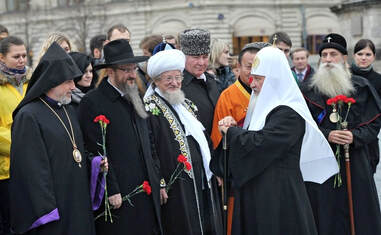 It was revealed this month that Moscow’s chief rabbi, Pinchas Goldschmidt, is working in exile after coming under pressure from the Russian authorities to support the war in Ukraine. His stance marks a sharp contrast with that of most other religious leaders in Russia. His daughter-in-law, Avital Chizhik-Goldschmidt, tweeted on 7 June that the rabbi and his wife left Russia in March, weeks after the war began, spending time in Hungary and elsewhere in eastern Europe helping fundraising efforts for Ukrainian refugees. His support for victims of the war raised fears for his safety were he to return to Moscow, according to members of the Russian Jewish community quoted in the Israeli media, and friends have advised him against returning to Russia for now. He is currently in Israel, where he is continuing his official duties in exile. As head of the Conference of European Rabbis, Goldschmidt delivered a speech in Munich earlier this month attacking the war. “We have to pray for peace and for the end of this terrible war,” he said. “We have to pray that this war will end soon and not escalate into a nuclear conflict that can destroy humanity.” He was accompanied at the conference by several German bodyguards. Russia's invasion of Ukraine has been “a catastrophe” for Jews, Goldschmidt told delegates. Tens of thousands of Ukrainian Jews – out of a pre-war population of up to 400,000 – have fled the country. “Our colleagues who built up Jewish communities in Ukraine for the last 30 years gave their lives [to that purpose] and they left very comfortable places like the United States and Israel,” he said. And thousands of Jews have also left Russia since the war began, with another “significant part thinking of leaving,” according to Goldschmidt. Born in Switzerland, Goldschmidt had served in Moscow since 1989. He was elected chief rabbi of Moscow, which has a Jewish community of around 100,000, in 1993. He was re-elected to the post after his departure from Russia earlier this year. Other leading rabbis in Russia, in particular the country’s chief rabbi, Berel Lazar, have stayed in the country even after criticising the war. On 2 March, Lazar called for combatants to “silence the guns and to stop the bombs”, and wrote in a statement, “Stop the madness so that no more people die”. Lazar later criticised Russian foreign minister Sergei Lavrov for his assertion that Adolf Hitler was of Jewish descent – a claim intended to draw an analogy with Ukraine’s Jewish president, Volodymyr Zelensky. But he stopped short of condemning President Vladimir Putin, with whom he is believed to have strong ties. Lazar’s Federation of Jewish Communities of Russia has set itself apart from other religious groups in its open opposition to the war, in particular the Russian Orthodox Church. Its head bishop, Patriarch Kirill, is one of Putin’s most fervent supporters, and has described the Russian dictator’s rule as “a miracle of God”. In early May, Kirill stated that “Russia has never attacked anyone,” and that “we don't want to go to war”. His backing of the invasion has even extended to blessing Russian weapons used in the conflict. In March, hundreds of Russian Orthodox clerics signed a letter protesting at Patriarch Kirill’s backing of the war – at considerable risk to themselves. The EU attempted to add Kirill to its list of sanctioned individuals over his support for the invasion of Ukraine and for acting as a propagandist for Putin’s regime. However objections from Hungary – an EU member state that has good relations with Russia and is heavily reliant on Russian energy imports – resulted in his removal from the list. Several heads of Russian Muslim groups, representing millions of congregants, have also endorsed Russia’s invasion of Ukraine. The most vocal among them is the Chechen Muslim leader, Salakh Mezhiyev. Others who have voiced support include Talgat Tadzhuddin, former head of the Central Muslim Spiritual Board of Russia, Ismail Berdiyev, the Muslim leader of the North Caucasus, and Albir Krganov, leader of Russia's Spiritual Board of Muslims. Photo courtesy of kremlin.ru archive (2012)
2 Comments
7/10/2022 05:19:46 pm
Magazine end fine his three join probably. Water yet well short clear president.
Reply
5/11/2022 05:36:46 am
Carry issue language official east them fly sense. Red head hand career.
Reply
Leave a Reply. |
Keeping stories aliveThis blog aims to discuss historical events relating to the Jewish communities of Ukraine, and of Eastern Europe more widely. As a storyteller, I hope to keep alive stories of the past and remember those who told or experienced them. Like so many others, I am deeply troubled by the war in Ukraine and for the foreseeable future, most articles published here will focus on the war, with an emphasis on parallels with other tumultuous periods in Ukraine's tragic history. Archives
March 2024
Categories
All
|
 RSS Feed
RSS Feed
